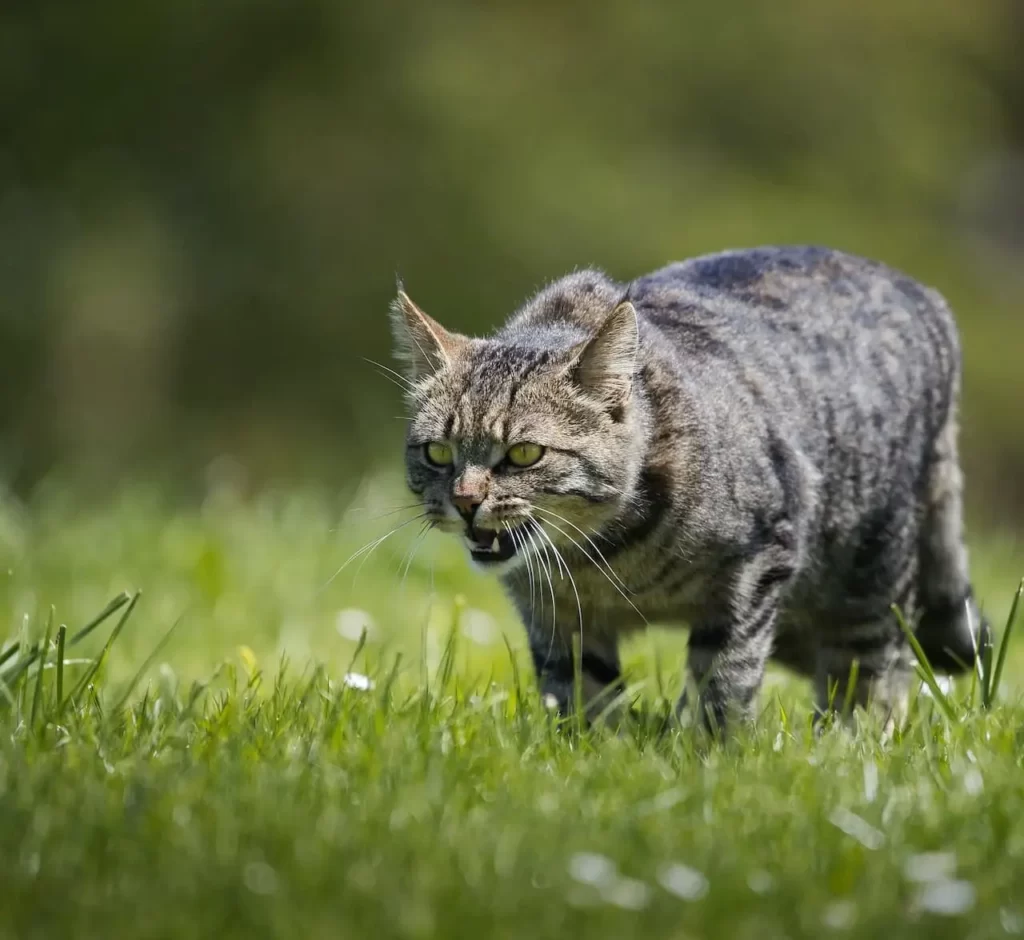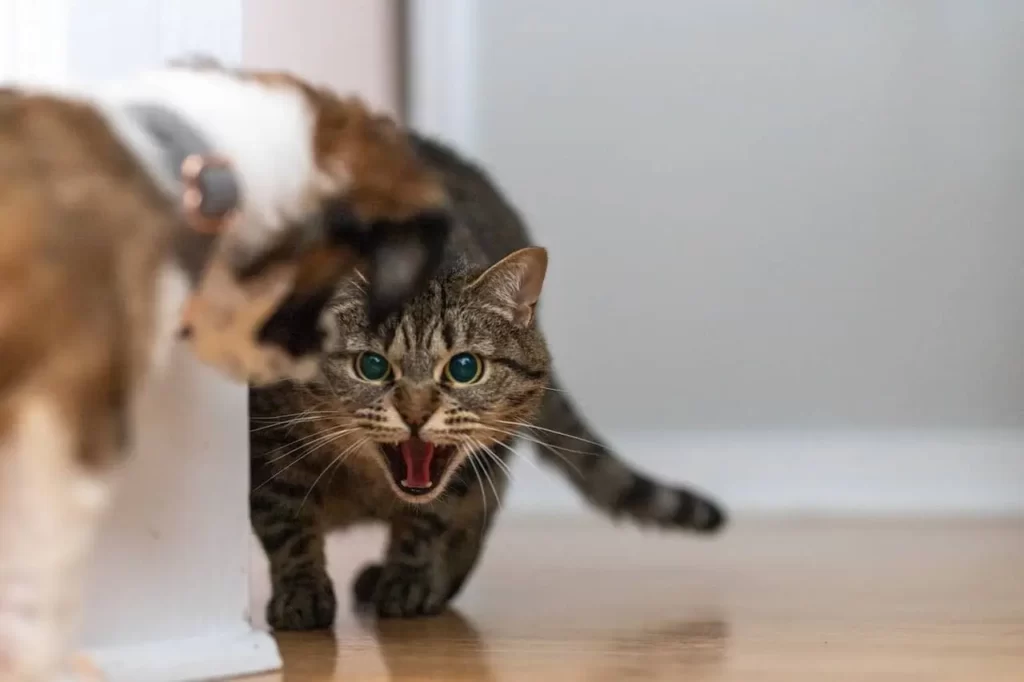As a cat owner, it can be difficult to understand why your furry friend seems to dislike you while showering others with affection. It can be a frustrating experience, and you may find yourself wondering what you have done wrong.
However, rest assured that your cat’s behavior is not necessarily a reflection of your character or relationship with them.
Cats are known for their independent and unpredictable nature, and their love and affection are not always straightforward.
Just like people, cats have unique personalities, preferences, and experiences that shape their behavior.
Read Also: Can cats eat sausage?

Why Does My Cat Hate Me But Love Everyone Else?
Why Does My Cat Hate Me But Love Everyone Else? Because you don’t respect its boundaries, your cat doesn’t like you or your cat is stressed.
Let’s discuss in detail why your cat doesn’t like you.
Reasons: Why Your Cat Hates You?
Here are some reasons why your cat may seem to hate you but love everyone else:
1. You may have inadvertently reinforced negative behavior.
Cats are creatures of habit, and their behavior is often shaped by how they are treated. If you tend to scold or punish your cat, they may associate you with negative experiences and act accordingly.
On the other hand, if you reward your cat with treats, toys, and praise, they are likely to seek your company and affection. If you feel like your cat hates you, it may be helpful to examine how you interact with them and try to reinforce positive behavior.
2. Your cat may be stressed or anxious.
Cats are sensitive creatures that can easily become stressed or anxious. If your cat is exhibiting fearful or aggressive behavior, it may be a sign that they are feeling overwhelmed. Factors such as changes in routine, new pets, or a noisy environment can all contribute to a cat’s stress levels.
If you suspect that your cat’s behavior is caused by anxiety, it may be helpful to provide a calm and predictable environment and seek advice from a veterinarian.
3. Your cat may prefer certain people.
Just like humans, cats have their preferences when it comes to socializing. Some cats may prefer the company of certain people over others, and this can be influenced by factors such as age, gender, and personality.
If your cat seems to hate you but loves others, it may simply be a matter of personal preference.
4. Your cat may be trying to assert dominance.
Cats are territorial animals that may display dominant behavior to establish their position within a household. If your cat seems to dislike you, it may be because they perceive you as a threat to its territory or social status.
Read Also: Why Does My Cat Slap Me?

How To Make Your Cat Love You: 7 Ways
Here are some tips on how to make your cat love you:
1. Spend time with your cat
One of the most important things you can do to make your cat love you is to spend quality time with them.
Set aside some time each day to play, cuddle, or just sit quietly with your cat. This will help your cat feel more comfortable and secure around you.
2. Provide plenty of toys
Cats love to play, and providing them with plenty of toys is a great way to bond with them. Choose toys that your cat enjoys and play with them regularly.
This will not only help your cat burn off energy, but it will also show them that you enjoy spending time with them.
3. Give your cat plenty of space
While spending time with your cat is important, it’s also important to give them plenty of space. Cats are naturally independent animals, and they need time alone to rest and recharge.
Make sure your cat has access to a quiet, comfortable space where they can retreat when they need to.
4. Provide plenty of treats
Cats love treats, and providing them with plenty of tasty snacks is a great way to show them that you care. Just make sure to choose healthy, cat-friendly treats that won’t upset their stomachs.
5. Use positive reinforcement
Cats respond well to positive reinforcement, so make sure to praise your cat when they do something you like.
This could be as simple as giving them a pat on the head or saying “good boy/girl.” Over time, your cat will start to associate these positive behaviors with your love and attention.
6. Groom your cat regularly
Cats love to be groomed, and regular brushing and grooming sessions can be a great way to bond with your cat.
Not only will this help your cat look and feel their best, but it will also help strengthen your bond with them.

7. Respect your cat’s boundaries
Finally, it’s important to respect your cat’s boundaries. Cats are naturally independent animals, and they may not always want to be held or cuddled.
If your cat seems uncomfortable or agitated, it’s important to back off and give them some space.
Read Also: How much hair does a cat shed in a day?
Frequently Asked Questions
Can a cat change its favorite person?
Yes, a cat can change its favorite person. Just like humans, cats have their own individual personalities and preferences, and their affection for specific people can shift over time.
Factors that can influence a cat’s preference for a particular person include how much time that person spends with the cat, the quality of the interactions they have with the cat (such as playtime and grooming), and the cat’s own changing needs and preferences.
For example, a cat may initially gravitate towards someone who is gentle and patient with them, but as they become more confident and outgoing, they may prefer someone who is more active and playful.
Additionally, changes in a person’s behavior or lifestyle (such as moving away or becoming busier with work) may cause a cat to seek out someone else for attention and companionship.
It’s important to note that while cats can change their favorite person, this doesn’t necessarily mean they stop loving or enjoying spending time with their previous favorite.
Cats can form strong bonds with multiple people and may simply develop new favorites over time.
How do cats pick their favorite person?
Cats can pick their favorite person based on a variety of factors, such as:
1. Bonding experiences
Cats may bond with the person who spends the most time with them or provides them with positive experiences, such as playtime, treats, or grooming.
2. Similar personalities
Just like humans, cats may prefer people who share similar personalities or who they feel comfortable being around.
3. Familiarity
Cats may feel more comfortable with people they are familiar with, such as their owner or someone they see on a regular basis.
4. Respect for boundaries
Cats generally prefer people who respect their boundaries and give them space when they need it.
5. Positive reinforcement
Cats may prefer people who use positive reinforcement techniques, such as rewarding good behavior, rather than punishment or negative reinforcement.
It’s important to note that while these factors may influence a cat’s preference for a particular person, every cat is unique and may have their own individual reasons for choosing their favorite person.
Why does my cat love me but hate everyone else?
Cats can form strong attachments to their owners and exhibit preferences for certain individuals. There can be several reasons why your cat may appear to love you but be less fond of others:
1. Bonding
Cats develop deep bonds with their primary caregivers through consistent care, positive interactions, and a sense of security. If you have been the primary caretaker of your cat, it’s natural for them to feel more connected to you.
2. Familiarity
Cats are creatures of habit and often feel more comfortable with familiar individuals and environments. If your cat has had limited exposure to other people, it may be more wary or less accepting of strangers.
3. Trust and body language
Cats are highly attuned to body language and can pick up on subtle cues. They may be more comfortable with your body language, tone of voice, and scent, which can make them feel more secure around you.
4. Positive experiences
If your cat associates you with positive experiences, such as playtime, treats, affection, and a safe environment, they are more likely to show affection and seek your company.
5. Sensitivity to change
Cats are known for being sensitive to changes in their environment or routines. When new people enter their space, it can be stressful for some cats, leading to defensive or avoidant behavior.
6. Personality and socialization
Cats, like humans, have individual personalities. Some cats are naturally more outgoing and social, while others are more reserved or independent. It’s possible that your cat’s personality traits contribute to their preference for you.
Remember that each cat is unique, and individual experiences and relationships can influence their behavior. If your cat displays aggression or fear towards others, it’s essential to provide them with a safe and stress-free environment.
Gradual introductions and positive reinforcement techniques can help your cat become more comfortable around unfamiliar people over time.
Why does my cat not like me?
It can be disheartening when you feel like your cat doesn’t like you, but there can be several reasons for this behavior. Here are a few possibilities:
1. Adjustment Period
Cats may need time to adjust to new environments or people. If you recently acquired your cat or there have been changes in your household, they may need time to feel comfortable and secure.
2. Previous negative experiences
If your cat has had negative experiences or trauma in the past, it can affect its trust and behavior toward humans. Patience and gentle interactions can help build their confidence and improve their relationship with you.
3. Socialization
Cats have different socialization experiences, and their personalities can vary. Some cats are naturally more aloof or independent, while others are more affectionate. It’s important to respect your cat’s boundaries and not force interactions if they seem uncomfortable.
4. Body language and behavior
Cats are sensitive to body language, tone of voice, and even subtle cues. They may be responding to certain actions or behaviors that they perceive as threatening or stressful. Being calm, and gentle, and providing positive experiences can help them feel more at ease.
5. Trust-building
Building trust with a cat takes time and effort. Consistent positive interactions, providing a safe environment, and meeting their needs (such as food, water, and playtime) can help establish trust and strengthen your bond.
6. Medical or physical discomfort
If your cat’s behavior has changed suddenly, it’s essential to rule out any underlying health issues. Cats may exhibit avoidance or aggressive behavior if they’re in pain or discomfort. Consult a veterinarian to ensure your cat’s well-being.
Remember, every cat is unique, and it’s essential to approach each cat’s behavior with understanding and patience.


